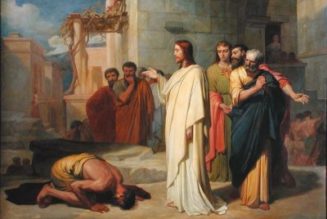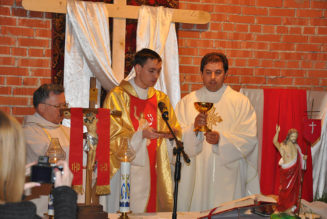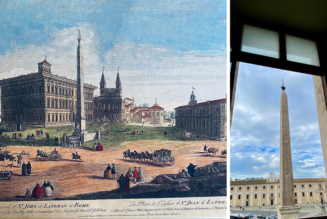Happy Friday friends,
There are many feasts marked in the calendar today, if you’re keeping track.
It’s the feast of the seven holy founders of the Servites — the Servants of the Blessed Virgin Mary.
If your festal tastes run to the Celtic, today is also the feast of St. Fintan of Clonenagh, who was one of those sixth-century Irish monastics whose faith wasn’t so much formed as forged under severe religious rule and penitential practice, and who did so much to make Ireland a thriving center of evangelization in subsequent centuries.
It is also the feast of Blessed William Richardson of Hallam. Born in Yorkshire, he studied for the priesthood in Spain before being sent back to England at the height of the Elizabethan persecution. Once he was back home, he traveled under the name William Anderson but he was soon betrayed and arrested at Gray’s Inn in London.
He was convicted within a week and, according to the enlightened English common law custom, hanged, drawn, and quartered — probably the only method of execution to give the Roman practice of crucifixion and the Chinese death by a thousand cuts a run for their money for sheer barbarity.
Blessed William enjoys the distinction of being the last Catholic to be martyred under the reign of Bloody Queen Bess, who died barely a month after him, in 1603.
I mention William mostly because I had never heard of him until I came to write this newsletter, and yet his martyrdom has surely worked towards the salvation of England — or at least the country’s sparing from Almighty annihilation.
The saints and the martyrs are all around us friends, and they are greater in number than we realize.
The News
Maybe you think you know something about the political situation in Venezuela. If so, you might think that a story about the country’s senior archbishop getting into a very public fight with a very senior politician is par for the course.
But you would be wrong.
And I can tell you it involves a bishop giving a blistering homily at one of the largest Marian processions in the world, to a crowd of 3 million.
I would also mention that the bishop is only the apostolic administrator of his archdiocese, most likely because of a concordat between the Vatican and the Venezuelan government, which gives Maduro effective veto power over making his appointment permanent.
This is a story about a major feud erupting between an archbishop desperately standing up for his people, and facing a very angry, and potentially very, very violent government thug as a result — all at a time when the Maduro regime has actually been trying to court the Church in the country.
One other thing: Edgar does a lot of reporting on Latin America for us here at The Pillar, but we first hired him to cover Venezuela, because that’s his home country.
This is some serious, old-school journalism he is doing here — not some New York Times deep dive into how TikTok microaggressions are triggering the city’s thriving vegan falafel subculture. This is the kind of reporting that carries real risks for Edgar, and can have very real consequences for him and his family.
—
In the Netherlands, Cardinal Willem Eijk of the Archdiocese of Utrecht, is doubling down on getting Catholics to go to Mass on Sunday.
The communion services, permitted by the Vatican’s 1988 “Directory for Sunday Celebrations in the Absence of a Priest,” involve a liturgy of the word, followed by the distribution of holy communion by a deacon or lay person. They’ve grown increasingly popular in many parts of Europe as the number of priests has declined, and in parts of Utrecht they have become the norm.
But in 2019 Eijk said he was going to phase the liturgies out in his archdiocese, to ensure that “the celebration of the Eucharist will regain more of its central place on Sundays and solemnities in the archdiocese.”
Some local Catholics weren’t happy about that, and launched a petition, arguing that since so many of the archdiocese’s churches and parishes are slated for closure and mergers anyway, they should be allowed to carry on as they are until that happens.
But Eijk rejected that argument this week, saying that the parish merger plan, while dramatic, will take years to implement, and “the Eucharistic celebration [would] not be able to occupy its rightful central place for many years to come.” And that’s just not OK, the cardinal concluded.
This all might sound like something far away, and barely recognizable to American Catholic life. But the demographics of the Church in this country aren’t pointing in the right direction, either, and these kinds of debates could come uncomfortably close to home sooner than you might think.
—
Christians in Nigeria remain under intense, violent, and often relatively anonymous persecution. Last year alone, hundreds were killed, thousands were displaced, and little or nothing has been done by the local police and army in response.
These included 18 cases in which priests were kidnapped, and four in which they were killed. And the numbers have done nothing but climb since then.
These are our brothers and sisters, suffering and dying for their faith, to little or no wider interest and with hardly a finger being stirred in their defense. One day we, or maybe our children, will read the papal bull canonizing the martyrs of Nigeria’s current persecution and beg for their intercession.
They are asking for ours now.
—
Lent is just around the corner, and for an inexplicable number of American Catholics, that means it’s time to start thinking about St. Patrick’s Day.
I say “inexplicable,” but the reasons Americans celebrate St. Patrick’s Day with a special enthusiasm you don’t tend to find anywhere else – including Ireland – are fairly interesting. But they tend to be more cultural than pious in their origins.
This year St. Patrick’s Day happens to fall on a Friday in Lent.
But who is covered by the dispensations? And what do you do if your bishop hasn’t granted one — or if you’re unsure if it applies to you?
What even is a dispensation, anyway? Can it possibly cover the ungodly affront to nature that is “green beer”?
Well, we have an explainer for you, and it covers everything.

Don’t miss it.
—
I should note that the explainer on St. Patrick’s Day dispensations is only current as of today. It could change.
Canon law is clear that all diocesan bishops have the general power to dispense their subjects from all universal and particular ecclesiastical laws, provided they aren’t explicitly reserved to the Apostolic See — which the laws on fasting and abstinence definitely are not.
At least canon law is clear about that today.
It’s entirely possible he could wake one morning between now and March 17 and write a letter to all the U.S. bishops insisting that, actually, he’s the High Grand Panjandrum of St. Patrick’s Day. We’ll just have to wait and see.
If you’re not sure what I am talking about, you should really read this analysis by JD. Really.
—
The Archbishop of Canterbury, Justin Welby, has been having a rough few weeks. The General Synod of the Church of England (which is a legislative body) voted recently to bring in church blessings for same-sex unions, and it seems to have upset just about everyone in global Anglicanism.
Conservatives, both in England and most especially in Africa (where the Anglican communion’s largest provinces are) have denounced it as a denial of basic Biblical teaching and the nature of marriage. Progressives, including UK politicians, are furious that the CofE didn’t go all the way and endorse same-sex marriages.
In the middle of all this, trying to keep the worldwide Anglican communion together, is Welby. Having already promised he wouldn’t perform and same-sex blessings himself, this week he offered to remove the office of Archbishop of Canterbury as one of the global points of communion for Anglicans.
For Catholics thinking about our own global synodal process, and the moves by a few prominent cardinals and European bishops’ conferences to use it to bring these same kinds of blessing in, it’s easy to wonder if we aren’t heading in the same direction.
I think he can — but he can’t avoid schism by doing nothing. At least not for very long.
The truth is out there
I don’t know how closely you have been following the great balloon scare of 2023. I’ve been dipping in and out enough to know the Top Gun boys have iced a few of these things in the last few weeks, but the government isn’t exactly sure, or being exactly straight, about what they are or where they all came from.
I confess, I kind of checked out of the coverage when the White House started saying pointedly that there was no reason to believe the flying objects were from outer space.
We all know that whenever anyone from behind a podium starts talking about UFOs, the nutters are going to come rolling out of the Nevada desert to talk about aliens and government conspiracies. It’s just a fact of life.
But while it isn’t going to hold my attention as “hard news,” you know what? I kind of love it.
UFO nuts are, by and large, America’s great eccentrics. A little cracked, to be sure. But they are harmless fun, and an often entertaining reminder that we don’t actually know everything about what’s out there.
Case in point: this week, a friend sent me a link to a video by a guy called Taylor Marshall, or Doctor Taylor Marshall, as he apparently likes to be called.
Marshall has some half a million subscribers on YouTube, and makes daily to-camera videos addressing the most pressing Catholic news of the day, like “Was Pope Francis arrested during a blackout at the Vatican?”
This week, he posted a video in which he discussed a report in the Wall Street Journal about a new task force, formed to study the surprising number of Chinese spy balloons and various other who-knows-what contraptions, which the Air Force has been knocking out of the sky.
“This my friends,” he opens by saying, “is a complete psy-op. A psychological operation to distract you and deceive you.” More on this later, though I note that he doesn’t say what exactly we’re supposed to be distracted from.
But he does say something pretty interesting.
“We are going to talk about what are aliens, and what are UFOs,” he says, while reading from the WSJ piece.
“Let me tell you what an alien is,” he continues. “An alien is a demon.”

Now, I want to pause for a moment here and make one thing clear — demons are, in fact, very real. And messing around with that stuff, or taking it lightly, is a seriously bad idea. I know priests who’ve trained and worked as exorcists, and there is nothing funny about what they have seen and been through. This isn’t that.
Marshall goes on to claim that for centuries “everyone” knew that any non-human “personage” with “form and intelligence” was either an angel or a demon.
Belief in extraterrestrials, he says, is just a product of Western secularization, a way of sublimating what we all used to know was really up there, which we apparently started doing in the 1950s.
This is, as the kids say, “big, if true,” even if it seems a little unfair to HG Wells, who was writing about such aliens in the 19th century, and didn’t seem to think they were demons.
Marshall offered some Biblical proof-texting for his thesis that the U.S. government is trying to run a “psy-op” on the American people to distract them from the demonic reality above our heads.
I’d try to parse it for you, but the logic was a little hard to follow — “trans” alien locusts in the book of Revelation did make an appearance, though.

Why the government is running this “psy-op,” Marshall doesn’t exactly say, and I wish he had — I was really curious by the end. If these aren’t Chinese spy balloons, but actual fallen angels that the USAF is blowing out of the sky, I’d have thought the government would be bragging about it. It would certainly give me a whole new respect for the military.
The video rounds off with some comments about the Emmys, which I couldn’t really follow because I didn’t watch them, but I have to say I was thoroughly entertained throughout.
Of course, I am sure there are some sincere Catholics out there watching this stuff and taking it seriously — he does have half a million followers after all.
We live in the internet age, and, like it or not, people make all kinds of choices about what they are going to watch, read and believe. And we do have a responsibility to do our part to share the truth where we find it, and debunk the nonsense when it’s sent to us.
But that doesn’t mean you can’t find it bloody hilarious.
See you next week,
Ed. Condon
Editor
The Pillar










